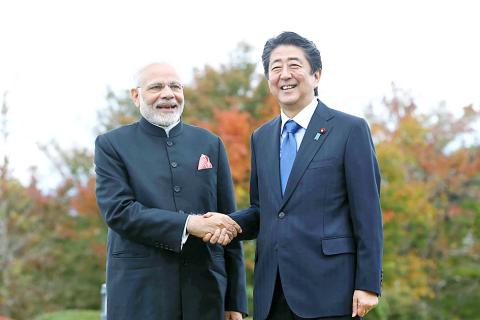The leaders of Japan and India are reaffirming their ties amid growing worries about trade and regional stability.
Indian Prime Minister Narendra Modi, who arrived in Japan on Saturday, yesterday met Japanese Prime Minister Shinzo Abe at a resort area near Mount Fuji.
Modi also visited a nearby plant owned by major Japanese robot maker Fanuc Corp.

Photo: AFP
Relations with China are a major issue shared by Modi and Abe, as their cooperation might balance China’s growing regional influence and military assertiveness.
“The India-Japan partnership has been fundamentally transformed and it has been strengthened as a special strategic and global partnership,” Modi told Kyodo news agency. “There are no negatives, but only opportunities in this relationship, which are waiting to be seized.”
Modi chose Japan among the first nations to visit after taking power four years ago.
He has been urging countries in the Indo-Pacific region to unite against protectionism and cross-border tensions.
In another sign of closer relations, India and Japan are to hold their first joint military exercises involving ground forces, starting next month.
Abe has just returned from China, where he met Chinese President Xi Jinping (習近平) and agreed that the two nations were “sharing more common interests and concerns.”
US President Donald Trump’s policies, which have targeted mostly China with tariffs, but also Japan and other nations, accusing them of unfair trade practices, are working to prod India and Japan to promote their economic ties.
The Japanese Ministry of Foreign Affairs said the leaders had lunch at a hotel in Yamanashi Prefecture, west of Tokyo, and exchanged a wide range of views on pursuing “a free and open” Indo-Pacific region.
Abe told Modi about his trip to China and both sides agreed on the need to cooperate closely on getting North Korea to drop nuclear weapons development, the ministry said in a statement.
Japan’s investment in India still has room to grow. The country is helping India build a super-fast railway system.
Abe has made bolstering and opening the nation’s economy central to his policies, called “Abenomics,” and has encouraged trade, foreign investment and tourism.
Although Japan has long seen the US as its main ally, especially in defense, Abe is courting other ties.
He has also been vocal about free trade, which runs counter to Trump’s moves to raise tariffs.
Earlier this year, Japan signed a landmark deal with the EU that will eliminate nearly all tariffs on products they trade.
European and Japanese leaders pledged to strengthen their partnership in defense, climate change and human exchanges, to send what they called a clear message against protectionism.
Abe and Modi are to hold a more formal summit today in Tokyo.

DEFENDING DEMOCRACY: Taiwan shares the same values as those that fought in WWII, and nations must unite to halt the expansion of a new authoritarian bloc, Lai said The government yesterday held a commemoration ceremony for Victory in Europe (V-E) Day, joining the rest of the world for the first time to mark the anniversary of the end of World War II in Europe. Taiwan honoring V-E Day signifies “our growing connections with the international community,” President William Lai (賴清德) said at a reception in Taipei on the 80th anniversary of V-E Day. One of the major lessons of World War II is that “authoritarianism and aggression lead only to slaughter, tragedy and greater inequality,” Lai said. Even more importantly, the war also taught people that “those who cherish peace cannot

STEADFAST FRIEND: The bills encourage increased Taiwan-US engagement and address China’s distortion of UN Resolution 2758 to isolate Taiwan internationally The Presidential Office yesterday thanked the US House of Representatives for unanimously passing two Taiwan-related bills highlighting its solid support for Taiwan’s democracy and global participation, and for deepening bilateral relations. One of the bills, the Taiwan Assurance Implementation Act, requires the US Department of State to periodically review its guidelines for engagement with Taiwan, and report to the US Congress on the guidelines and plans to lift self-imposed limitations on US-Taiwan engagement. The other bill is the Taiwan International Solidarity Act, which clarifies that UN Resolution 2758 does not address the issue of the representation of Taiwan or its people in

Taiwanese Olympic badminton men’s doubles gold medalist Wang Chi-lin (王齊麟) and his new partner, Chiu Hsiang-chieh (邱相榤), clinched the men’s doubles title at the Yonex Taipei Open yesterday, becoming the second Taiwanese team to win a title in the tournament. Ranked 19th in the world, the Taiwanese duo defeated Kang Min-hyuk and Ki Dong-ju of South Korea 21-18, 21-15 in a pulsating 43-minute final to clinch their first doubles title after teaming up last year. Wang, the men’s doubles gold medalist at the 2020 and 2024 Olympics, partnered with Chiu in August last year after the retirement of his teammate Lee Yang

The Philippines yesterday criticized a “high-risk” maneuver by a Chinese vessel near the disputed Scarborough Shoal (Huangyan Island, 黃岩島) in a rare incident involving warships from the two navies. The Scarborough Shoal — a triangular chain of reefs and rocks in the contested South China Sea — has been a flash point between the countries since China seized it from the Philippines in 2012. Taiwan also claims the shoal. Monday’s encounter took place approximately 11.8 nautical miles (22km) southeast” of the Scarborough Shoal, the Philippine military said, during ongoing US-Philippine military exercises that Beijing has criticized as destabilizing. “The Chinese frigate BN 554 was